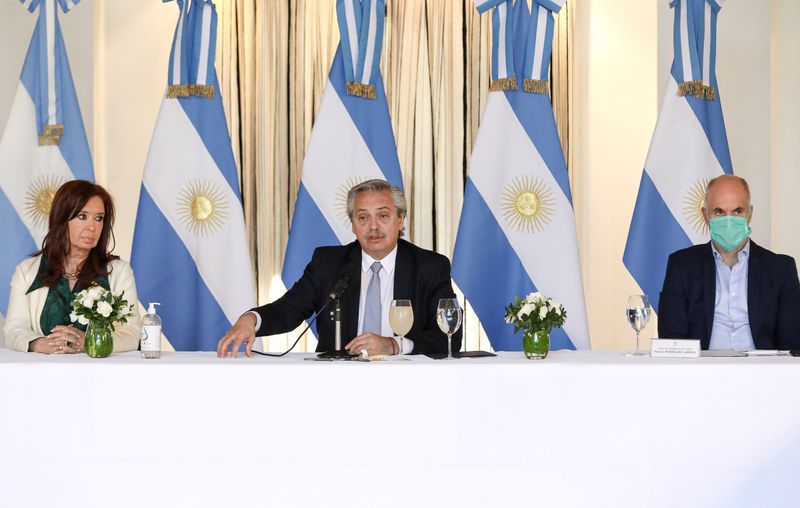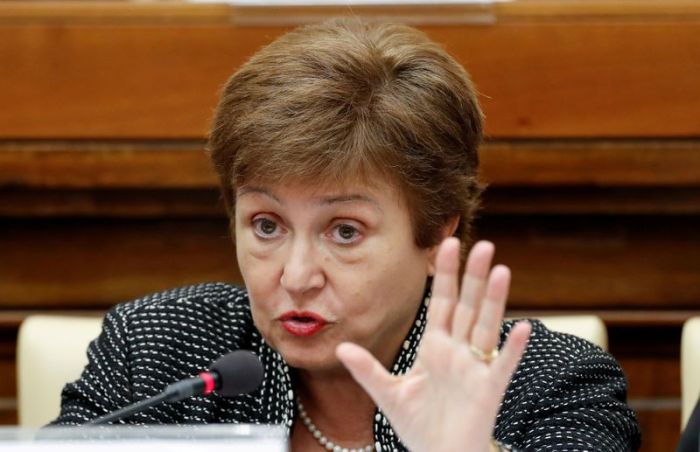BUENOS AIRES (Reuters) – Argentina sketched out its debt restructuring proposal to international creditors on Thursday, involving a three-year grace period, large coupon cuts and a smaller reduction in capital, as it looks to win over bondholders to a deal.
Economy Minister Martin Guzman laid out the framework of the proposal, which would involve around $41.5 billion of relief, mostly in the form of reduced interest payments, as the country grapples with a biting recession and the coronavirus pandemic.
The offer, which will be formally launched on Friday, is a key step in a long-running saga as Argentina has looked to revamp its heavy debt load after political upheaval and a market crash last year drove its bonds into distressed territory.
The proposal includes a sizeable cut to interest payments, amounting to a saving of around $37.9 billion, or 62% of the current total. The average proposed new rate would be 2.33%.
There would be a smaller capital cut of around $3.6 billion, or 5.4% of the total debt stock, Guzman said.
Analysts were mixed on the offer and were keen for more detail, but said the current environment, with many bonds already at 20-30 cents on the dollar, gave the offer some shine.
“It sounds better than what markets were pricing in,” said Gabriel Zelpo, director of Buenos Aires economic consultancy Seido. “Bondholders were afraid of something radical, like no coupon payments or high capital haircuts.”
Guzman, speaking in a televised news conference, said the government had still not reached an “understanding” about what would be sustainable with bondholders, who would have around 20 days from the formal launch before the offer closed.
“We understand in this period there are going to be people playing very tough. There are many interests at stake,” he said. “Today we cannot pay the debt. We have the will to do it, but we do not have the capacity to do so.”
Under the proposal, Argentina would make no payments from 2020 to 2022, then start with an average 0.5% coupon in 2023, which would rise over time but remain at “sustainable levels”.
Argentina’s proposal, which was initially expected to be made by mid-March, has been delayed by the global coronavirus outbreak, which has buffeted the country’s already fragile economy and led to a nationwide lockdown.
In a presentation document, the government said 21 bonds worth around $66.2 billion would be eligible for the offer.
The grain-exporting nation’s center-left president, Alberto Fernandez, has been racing to win over international creditors such as BlackRock Inc <BLK.N> and Pimco to overhaul its debt burden that the government insists it cannot currently pay.
Fernandez, speaking from the presidential residence in Olivos and flanked by regional governors and his fiery deputy Cristina Fernandez de Kirchner, said the country was unified behind the push to resolve the debt crisis.
“Just as we are all united in facing the pandemic, we are united in solving the problem of debt,” he said.
Alejandro Werner, director of the International Monetary Fund’s Western Hemisphere Department said the fund, which has separately extended around $44 billion to Argentina as part of a 2018 agreement, would analyze the offer over the next few days.
“We’re very hopeful that this will lead to a process that will eventually give us a conclusion in these negotiations – a successful conclusion,” Werner told a video news conference during the IMF-World Bank Spring meetings.
(Reporting by Cassandra Garrison, Maximlian Heath, Nicolas Misculin, Adam Jourdan, Hugh Bronstein and Wlater Bianchi, and David Lawder in Washington; Writing by Adam Jourdan; Editing by Peter Cooney and Daniel Wallis)



























